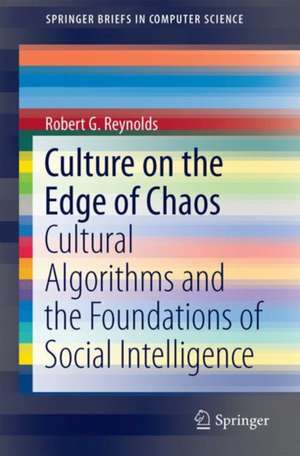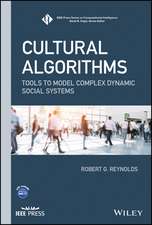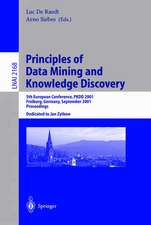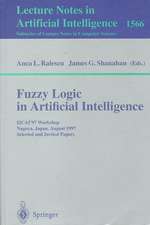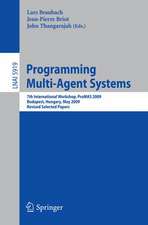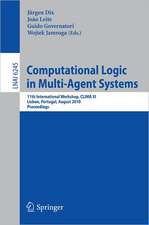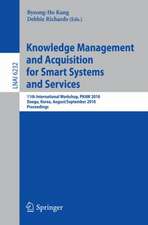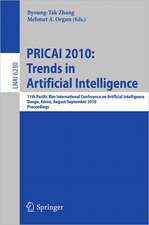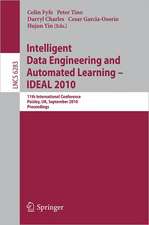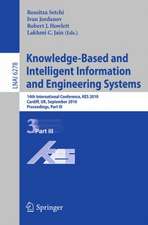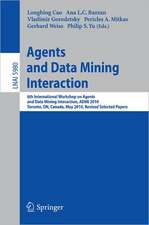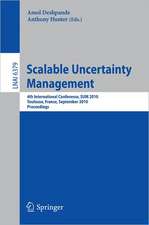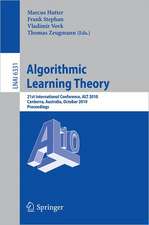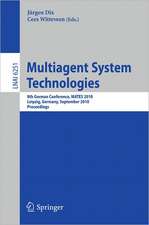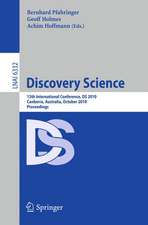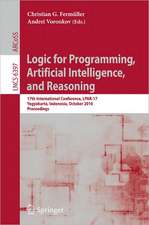Culture on the Edge of Chaos: Cultural Algorithms and the Foundations of Social Intelligence: SpringerBriefs in Computer Science
Autor Robert G. Reynoldsen Limba Engleză Paperback – 14 mai 2018
Din seria SpringerBriefs in Computer Science
-
 Preț: 475.83 lei
Preț: 475.83 lei - 20%
 Preț: 166.97 lei
Preț: 166.97 lei - 20%
 Preț: 325.63 lei
Preț: 325.63 lei - 20%
 Preț: 349.15 lei
Preț: 349.15 lei - 20%
 Preț: 302.49 lei
Preț: 302.49 lei -
 Preț: 381.81 lei
Preț: 381.81 lei -
 Preț: 446.47 lei
Preț: 446.47 lei - 20%
 Preț: 296.17 lei
Preț: 296.17 lei - 20%
 Preț: 335.66 lei
Preț: 335.66 lei - 20%
 Preț: 463.83 lei
Preț: 463.83 lei - 20%
 Preț: 323.00 lei
Preț: 323.00 lei - 20%
 Preț: 322.35 lei
Preț: 322.35 lei - 20%
 Preț: 321.85 lei
Preț: 321.85 lei - 20%
 Preț: 232.68 lei
Preț: 232.68 lei -
 Preț: 375.45 lei
Preț: 375.45 lei - 20%
 Preț: 323.00 lei
Preț: 323.00 lei - 20%
 Preț: 322.81 lei
Preț: 322.81 lei - 20%
 Preț: 324.17 lei
Preț: 324.17 lei - 20%
 Preț: 323.00 lei
Preț: 323.00 lei - 20%
 Preț: 322.17 lei
Preț: 322.17 lei - 20%
 Preț: 322.50 lei
Preț: 322.50 lei - 20%
 Preț: 323.34 lei
Preț: 323.34 lei - 20%
 Preț: 324.17 lei
Preț: 324.17 lei - 20%
 Preț: 323.46 lei
Preț: 323.46 lei - 20%
 Preț: 322.17 lei
Preț: 322.17 lei - 20%
 Preț: 322.02 lei
Preț: 322.02 lei -
 Preț: 341.50 lei
Preț: 341.50 lei - 20%
 Preț: 324.49 lei
Preț: 324.49 lei -
 Preț: 344.47 lei
Preț: 344.47 lei -
 Preț: 376.80 lei
Preț: 376.80 lei -
 Preț: 377.18 lei
Preț: 377.18 lei - 20%
 Preț: 324.17 lei
Preț: 324.17 lei - 20%
 Preț: 352.26 lei
Preț: 352.26 lei - 20%
 Preț: 321.32 lei
Preț: 321.32 lei - 20%
 Preț: 322.17 lei
Preț: 322.17 lei - 20%
 Preț: 324.17 lei
Preț: 324.17 lei - 20%
 Preț: 322.02 lei
Preț: 322.02 lei -
 Preț: 374.46 lei
Preț: 374.46 lei - 20%
 Preț: 320.21 lei
Preț: 320.21 lei - 20%
 Preț: 323.34 lei
Preț: 323.34 lei - 20%
 Preț: 324.17 lei
Preț: 324.17 lei - 20%
 Preț: 231.84 lei
Preț: 231.84 lei - 20%
 Preț: 294.97 lei
Preț: 294.97 lei - 20%
 Preț: 322.50 lei
Preț: 322.50 lei - 20%
 Preț: 323.46 lei
Preț: 323.46 lei -
 Preț: 374.08 lei
Preț: 374.08 lei -
 Preț: 408.23 lei
Preț: 408.23 lei - 20%
 Preț: 321.52 lei
Preț: 321.52 lei - 20%
 Preț: 323.34 lei
Preț: 323.34 lei - 20%
 Preț: 323.00 lei
Preț: 323.00 lei
Preț: 323.66 lei
Preț vechi: 404.58 lei
-20% Nou
Puncte Express: 485
Preț estimativ în valută:
61.94€ • 64.43$ • 51.14£
61.94€ • 64.43$ • 51.14£
Carte tipărită la comandă
Livrare economică 14-28 aprilie
Preluare comenzi: 021 569.72.76
Specificații
ISBN-13: 9783319741697
ISBN-10: 3319741691
Pagini: 138
Ilustrații: VIII, 108 p. 67 illus., 52 illus. in color.
Dimensiuni: 155 x 235 mm
Greutate: 0.18 kg
Ediția:1st ed. 2018
Editura: Springer International Publishing
Colecția Springer
Seria SpringerBriefs in Computer Science
Locul publicării:Cham, Switzerland
ISBN-10: 3319741691
Pagini: 138
Ilustrații: VIII, 108 p. 67 illus., 52 illus. in color.
Dimensiuni: 155 x 235 mm
Greutate: 0.18 kg
Ediția:1st ed. 2018
Editura: Springer International Publishing
Colecția Springer
Seria SpringerBriefs in Computer Science
Locul publicării:Cham, Switzerland
Cuprins
The Cultural Algorithm: Culture on the Edge of Chaos.- Cultural Algorithm Framework.- Modeling the Social Fabric.- Generating Chaos.- Social Metrics.- The Cultural Engine: Putting Individuals to Work.- Comparing Nuclear Family and Extended Family Organizations.- Comparison of Lineage Based Subculture Social Organization Performance.- Conclusions.- References.
Notă biografică
Prof. Robert G. Reynolds is a professor of computer science in the College of Engineering of Wayne State University, and a Visiting Research Scientist at the Museum of Anthropological Archaeology and the Center for Complex Systems at the University of Michigan, Ann Arbor. He developed the Cultural Algorithms paradigm, and has given invited talks on this topic at conferences such as WCCI and SSCI.
Textul de pe ultima copertă
The author first introduces the basic framework for cultural algorithms and he then explains the social structure of a cultural system as a mechanism for the distribution of problem-solving information throughout a population. Three different models for social organizations are presented: the homogeneous (nuclear family), heterogeneous (expanded family), and subculture (descent groups) social models. The chapters that follow compare the learning capabilities of these social organizations relative to problems of varying complexity. The book concludes with a discussion of how the results can impact our understanding of social evolution.
Caracteristici
Cultural algorithm has three major components: a population space, a belief space, and a communication protocol that describes how these components exchange knowledge Author originated the cultural algorithm, a branch of evolutionary computing Applications in understanding social evolution
